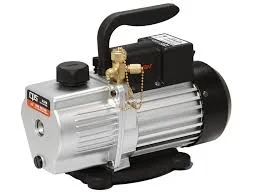- sales@biolabmarket.com
- +1 (469) 819-5592
How to Double the Lifespan of a Vacuum Pump?
One of the main concerns in the food, electronics, and pharmaceutical industries is increasing the lifespan of vacuum pumps. The durability of this equipment depends on proper maintenance and correct usage.
In this article, we will cover essential tips and practices that can help double the lifespan of your vacuum pump.

Understanding the Components of a Vacuum Pump
To properly maintain and extend the life of a vacuum pump, you first need to be familiar with its key components. The main parts include the motor, control systems, and the compressor. Each component plays a vital role, and if any of them malfunctions, the overall performance of the system will be affected.
Choosing the Right Oil
Always use the correct oil that matches your type of vacuum pump. Each pump requires a specific oil. Using low-quality or unsuitable oil can lead to increased wear, reduced performance, and a shorter pump lifespan.
Monitoring Temperature and Pressure
Regularly check and monitor the temperature and pressure of the pump. Excessive heat or pressure can cause severe damage and disrupt the pump’s operation. Installing temperature and pressure sensors helps prevent issues and allows timely corrective action.
Importance of Regular Maintenance
Routine maintenance is one of the most important factors in extending the life of vacuum pumps. Regular servicing should include:
- Checking components periodically
- Monitoring system performance
- Replacing oil and filters
Using High-Quality Filters
Always use high-quality filters. Over time, filters become contaminated, and if not replaced on time, they can put excessive strain on the pump.
Training Employees
Provide proper training for operators and staff on how to use and maintain the pump. Trained personnel can respond appropriately to problems—for example, using quality sealants in case of leakage to minimize risks.
Preventing Leaks
Leaks in the pump reduce its efficiency and shorten its lifespan. Regularly inspect joints and connections and repair them if necessary to prevent leaks.
Proper Load Management
Avoid overloading the vacuum pump. Exceeding its rated capacity can cause wear and severe damage to internal components. Always operate within the pump’s nominal capacity to ensure durability.
Using Suitable Accessories
Employing auxiliary equipment can improve performance and extend pump life. For instance, cooling systems can help regulate temperature and prevent overheating.
Frequently Asked Questions about Vacuum Pumps
- Does regular servicing increase the lifespan of a vacuum pump?
Yes. Periodic maintenance such as oil changes (in oil-sealed pumps), filter cleaning, and replacing worn components helps prevent premature failures and significantly extends the pump’s life. - How does oil selection affect pump performance?
Using high-quality vacuum pump oil ensures better lubrication, reduces friction, minimizes heat, and prolongs pump life. - Does frequent start-stop operation reduce pump lifespan?
Yes. Repeated starts and stops place additional stress on the motor and bearings, increasing the likelihood of early failures. - How does operator training affect pump maintenance?
Trained operators who know how to start, stop, and maintain the pump properly can prevent human errors and play a crucial role in extending its lifespan. - Why is using the right filter important?
Filters prevent dust, vapors, and particles from entering the pump. Without a suitable filter, internal components may suffer from scratches, wear, and reduced efficiency. - What role does ambient temperature play in vacuum pump performance?
Extreme temperatures (too high or too low) can reduce efficiency, alter oil properties, and increase stress on internal parts. Operating under recommended temperature conditions helps maximize pump longevity.
read more: vacuum pump price
